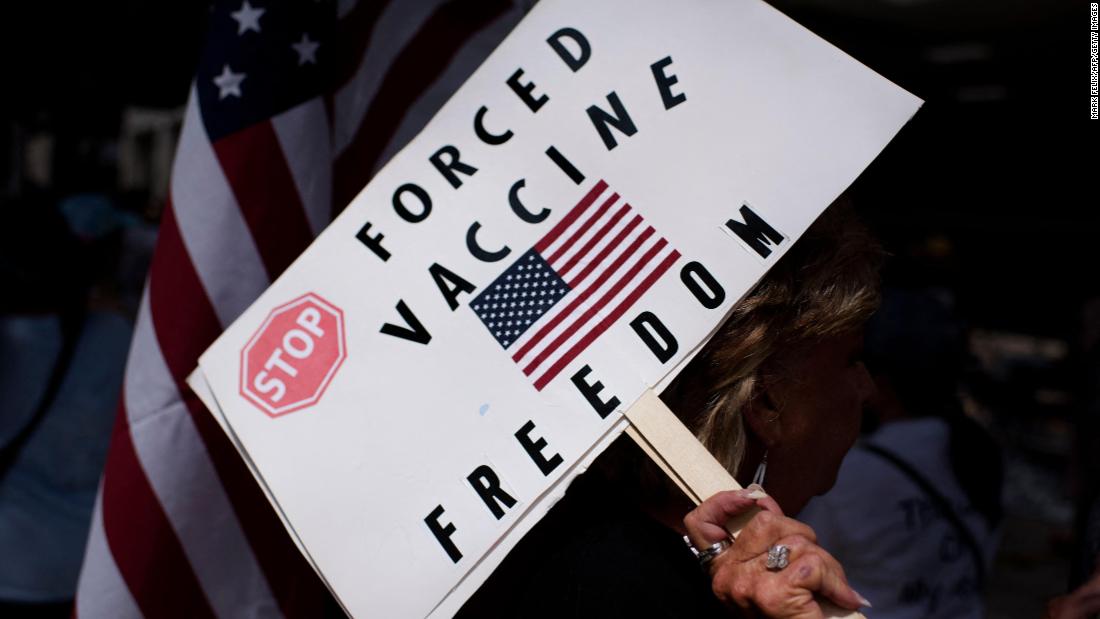Vaccines have saved billions of lives worldwide, but it seems very likely Americans will emerge from the Covid pandemic with fewer vaccine requirements — not more
The requirement in Italy is that anyone on a payroll, public or private, must have a recently certified vaccination, recovery from infection or a negative test within 48 hours. There’s an app for all this, which would make everything so much easier but is something we are unwilling to entertain here in the US.
Italy’s government says 81% of the eligible population is vaccinated, so these protests are giving us a good indication of where the vaccination holes are in that country. A “green” pass in their app has been required for certain trains, indoor restaurants, museums and gyms since September 1.
I wish it were possible to know how many additional people got the vaccine due to the requirement as opposed to protest. I would be willing to wager that a much larger number simply got the shot.
It’s the holdouts who make the headlines
There are already requirements in the US, for many companies, in certain states and cities, and hospital chains. And there is invariably a small minority of people who choose to leave their job rather than get vaccinated. It may be a larger than small minority at some Italian ports.
Southwest’s pilot union filed for a temporary restraining order against that company’s vaccine requirement. A day later, the airline was forced to cancel thousands of flights, although both the pilots and the airline say the two things are not related. The pilots aren’t necessarily opposed to the requirement, but they want to address it in their contract rather than simply accept it.
AFL-CIO President Liz Shuler stopped short of full-throated endorsement of a blanket vaccine requirement during a Q&A at the National Press Club Wednesday.
“We think everyone should be vaccinated,” she said. “And we think that the union has a role to play in negotiating that at the table.”
Opposing requirements altogether
The war over vaccine requirements has gotten so political that one Ohio congressman, Republican Rep. Jim Jordan, suggested ending all vaccine requirements of any kind.
That particular idea seems completely bananas given the billions of lives vaccines have saved worldwide and the heretofore relatively uncontroversial requirement for school kids to be inoculated against polio, tetanus, measles, mumps, rubella and more.
But at the same time it seems very likely, if completely insane, that Americans will emerge from the Covid pandemic with fewer vaccine requirements, not more.
Some people will never be convinced
CNN’s Dr. Sanjay Gupta, a neurosurgeon, spent three hours in a sound booth with Joe Rogan, the influential podcaster, MMA personality and vaccine skeptic.
Solidarity of one
He’s holding out in solidarity with people losing their jobs rather than get vaccinated, he said in an Instagram broadcast.
“Just know that I’m rocking with all those that have lost their jobs to this mandate, and I’m rocking with all those that chose to get vaccinated and are choosing to be safe, as well,” Irving said. “I’m on both sides of all this. I support and respect everybody’s decision.”
Except he’s not on both sides. He’s refusing to get vaccinated.
I thought this was interesting:
“A conservative case for mandates would look a lot like the case conservatives made for, say, the Patriot Act—something like, ‘in the face of a grave threat, we must give up a little freedom to protect our nation.’ he writes. “And the liberal case against mandates is so obvious that it’s the case conservatives are now literally making, having co-opted, with a kind of giddy hypocrisy, ‘my body, my choice’ rhetoric from the left.”
There are strikes going in the US right now
What Americans are not yet on strike about — except for Irving and the people leaving jobs rather than get vaccinated — is the vaccine.
They are considering strikes related to the pandemic.
You could argue the pandemic is achieving what Vermont Sen. Bernie Sanders and other progressives have long sought — workers who feel the power to demand higher wages and better working conditions.
Robert Reich, former Labor Secretary during the Clinton administration, says that while most Americans aren’t actively part of a union, what you’re seeing in data about millions of Americans quitting their jobs and slow to return to the workforce is a sort of disorganized collective movement alongside the actual labor strikes we’re seeing around the country.
“No one calls it a general strike. But in its own disorganized way it’s related to the organized strikes breaking out across the land — Hollywood TV and film crews, John Deere workers, Alabama coal miners, Nabisco workers, Kellogg workers, nurses in California, healthcare workers in Buffalo.”
![]()


